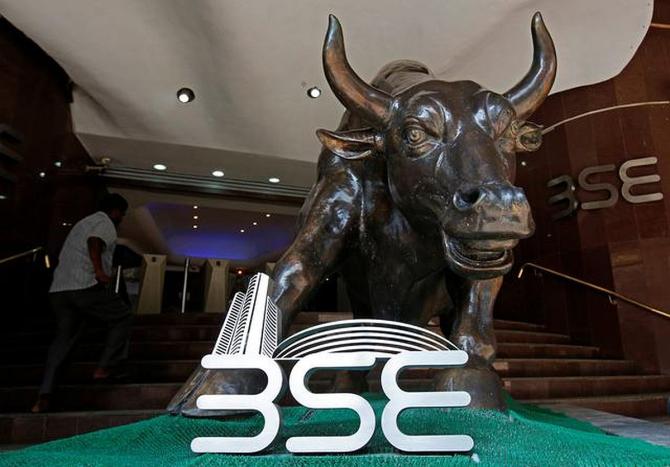 | « Back to article | Print this article |
In terms of stock selection, India continues to benefit from two phenomena – the big getting bigger and availability of quality stocks in relative abundance compared with its Asian peers.

BNP Paribas has maintained an overweight rating on Indian equities for calendar year 2021 (CY21) and expects the S&P BSE Sensex to hit 50,500 levels going ahead – up nearly 9.5 per cent from the current levels.
Besides India, BNP Paribas remains overweight on China, Indonesia and Korea.
Among Indian stocks, it has included ONGC and Marico in its model portfolio and has dropped Britannia.
After an expected contraction of 11.4 per cent in 2020, it expects India’s gross domestic product (GDP) to grow at 11.6 per cent in 2021 and at 5 per cent in 2022. Consumer price inflation (CPI), it said, is likely to be at 4.3 per cent in 2021 and 3.8 per cent in 2022.
A common thread running between China and India, BNP Paribas said, the focus is on some long-range economic plans – targeted at boosting consumption in China and on supporting investments in India.
"We continue to focus on quality and market leaders in India.
"Private banks and insurance companies should continue to benefit from market share gains.
"Consumer stocks benefitting from domestic rural demand and service exporters benefitting from reviving global deal flow shall continue to dominate the investment landscape," wrote Manishi Raychaudhuri, head of Asia Pacific equity research, BNP Paribas in his Asia Strategy 2021 report.
According to him, the economic recovery in India seems well entrenched with most high frequency indicators – auto sales, steel and cement consumption and railway freight traffic – are at or higher than their pre-Covid-19 levels.
A similar view is shared by those at Nomura.
The Nomura India Business Resumption Index (NIBRI) – a gauge used by the research and brokerage house to track the level of economic activity in the country in the backdrop of Covid-19 pandemic – picking up to 92.9 for week ending December 13 from 89.6 in the preceding week, tracking around 7 percentage points (pp) below the pre-pandemic levels.
In terms of stock selection, India, Raychaudhuri says, continues to benefit from two phenomena – the big getting bigger (and those ‘big’ stocks largely constitute the investable market) and the availability of quality stocks in relative abundance compared with its Asian peers.
"Consequent to continuous steps taken to formalize the economy over the past few years, we have seen large frontline companies in most sectors gain market share – and that has come as a boost to the equity market.
"Continued benefit to such large companies and the availability of a significant number of 'compounders' (consistent generators of excess returns) lead us to maintain our overweight stance on the Indian equity market," he wrote.
Key risks
That said, BNP Paribas believes the concerns about sustainability of India’s growth recovery remain and come from still sagging urban incomes, persisting high inflation and the questionable quality of banks’ balance sheets, especially the risks that they could face from their retail loan basket.
"In the wake of the Covid-19-related disruptions, urban employment destruction and urban income compression have clearly been much more pronounced than rural incomes.
"The consequent decline in urban propensity to consume non-essentials is not surprising but worrying nonetheless," Raychaudhuri wrote.
Those at Nomura, on the other hand, caution that once pent-up demand ebbs, the growth trajectory may become more vulnerable to weaker global demand and ongoing fiscal expenditure compression.
"However, we expect a mix of easier financial conditions, stronger global demand and ongoing vaccinations to drive an economic upcycle into 2021," wrote Sonal Varma, managing director and chief India economist at Nomura in a December 14 report co-authored with Aurodeep Nandi.
Photograph: Shailesh Andrade/Reuters